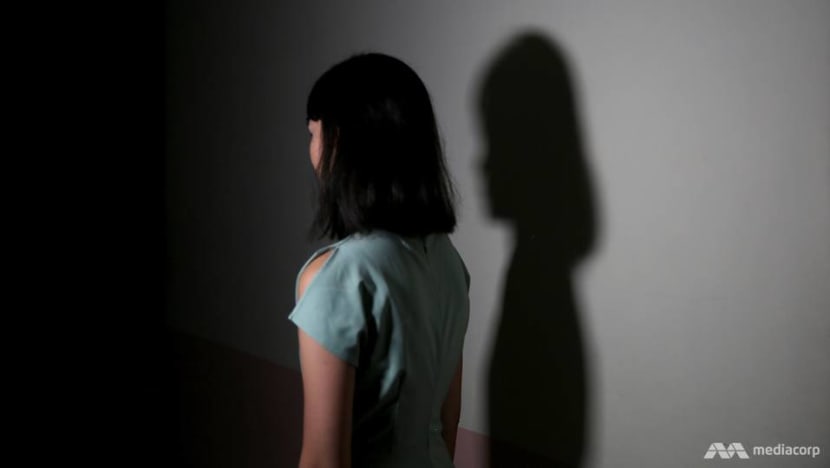commentary Commentary
Commentary: When we call people with strange behaviour mentally ill, we reinforce mental health stigma
Ridiculing those who disturb public peace or break the law by saying they’re “crazy” assumes mental illnesses will lead to destructive behaviour, to the detriment of people living with mental health conditions.

Composite image of two women whose behaviour made the rounds on social media this year.
SINGAPORE: There was a silver lining amid the grey cloud of the COVID-19 pandemic last year.
Much was reported about how working from home frankly made it hard to separate work from life, causing more burnout among employees.
In our private circles, it became increasingly common for friends to share refreshingly honest confessions about having bouts of anxiety and a general sense of ennui.
There has been much forthright talk of collective pandemic fatigue and acceptance that such commonplace challenges should lead us to cut each other some slack.
Blindsided by a pandemic that changed life as we knew it to be, and the loss of lives and livelihoods globally, we struggled to cope - but that struggle saw a beneficial rise in mental health awareness.
The resulting, urgent focus on mental health felt like a tiny but significant win.
READ: Guarding against pandemic fatigue in Singapore's COVID-19 fight
(Mental health groups have seen a surge in calls since COVID-19 hit. Who are the people tirelessly manning these helplines? Find out on Heart of the Matter.)
THEN SOME INCIDENTS HAPPENED
Yet, two videos that went viral on social media this year suggest we may still have some way to go in understanding and talking about mental health.
The first offensive clip was a woman making race-related comments on the MRT, where she asked commuters about their race. When a commuter responded she was Malay, the woman said, “Malay, is it? Okay, no wonder.”
Later in the video, she added that she would “never mix around with you guys because you are so different”.
The second and more recent video featured a woman without a mask in Marina Bay Sands. When a safe distancing ambassador asked her to put on her mask, she refused and asked instead for the ambassador’s credentials.
In both incidents, several online commenters called these women “crazy”, “with a hole in the brain” and “confirm mentally ill”.
The actions in the videos were problematic, but these comments left an even more bitter aftertaste.
READ: Commentary: Flaring tempers and public incidents – are we losing it because of COVID-19?
MENTAL ILLNESS IS NOT A PUNCHLINE
While some commenters explicitly mocked them, others seemed to have jumped the gun to assume these women had mental illness and urged others to understand.
Either way, such assumptions seem to reinforce the dated stereotype that those with mental illness would necessarily behave in “crazy” ways, and cannot be taken seriously - a fundamental reason for the prevailing stigma around mental illness.
“I still believe there’s a portion of Singaporeans who are not well-versed or have limited knowledge of mental health. That’s why they’re making such comments,” Porsche Poh, executive director of mental health non-profit organisation, Silver Ribbon (Singapore) said to me.
She cautioned against knee-jerk reactions to label others. “Some people might have unpleasant encounters, and they might draw conclusions based on those encounters. They have not attended any talks or workshops or learnt much about mental health issues.”
The comments also implied that mental illness must have caused their disruptive behaviour caught on camera.
READ: Commentary: We declare a goal of ending mental health stigma yet viciously mock the woman at Shunfu Market
Yet, psychologists have often pointed out that the symptoms of mental health conditions are more varied, sometimes subtle but serious for the patient - like decreased motivation, poor appetite and fatigue.
“Many mental health organisations have been working hard to collaborate with the media to raise awareness. It is a setback every time we come across such negative comments,” added Ms Poh.
If all this sounds familiar, recall the case of a woman in Shunfu Market who refused to wear a mask last year, because she was “a sovereign”. The circulating video captured her in a heated argument, and commenters were quick to assume that she, too, had an underlying mental health condition.
She was remanded at the Institute of Mental Health for two weeks with no mental disorder found, and recently sentenced to two weeks jail and a $2,000 fine.
Judging by similar reactions to that case a year ago, it seems more awareness has not translated to less stigma.
SO WHEN DOES MENTAL ILLNESS FACTOR IN?
Thankfully, this complex relationship between criminality and mental illness deserving of delicate, careful treatment is one our courts have recognised.
In fact, the criminal justice system in Singapore has a system for situations where criminals potentially have a mental health condition. It enlists the professional advice of psychiatrists in deciding the extent to which a mental health condition plays a role.
READ: Justice, mercy and a long road to recovery: An in-depth look at criminals with mental illness in Singapore
“Doctors will make an initial assessment on several things. One, what type of psychiatric condition this person has. Two, whether the conditions have anything to do with the offence. And three, does the psychiatric condition allow for this person to understand his plea,” Mr Shashi Nathan, a partner in criminal litigation at Withers KhattarWong, said.
“There are cases where someone’s condition is so advanced or debilitating that they might not understand the nature of the offence or the consequences of his actions.” On the other hand, some might be fit to plead, but still have some form of psychosis, he added.
The law takes into account nuances in judgment and sentencing. In less straightforward cases, two people might have the same condition but behave differently, while another two might have a different psychosis yet behave the same way.
“Everyone is an individual, so how psychosis affects them is also individualistic. The psychiatrist will make an assessment whether the psychosis affected the ability to make judgement, whether he fully understands the consequences of his act, and whether he’s unable to control his behaviour,” Mr Nathan said.
“As a defence lawyer, we’re relying on someone’s psychosis to mitigate a sentence or explain someone’s actions, so we have to show the court that there is a causal link between the condition and the offence,” he added.
For example, a shoplifter with a history of kleptomania would have their condition taken into consideration during sentencing, because kleptomania affects decision-making and has a “direct causal link” to shoplifting, he shared.
EVERYDAY ACTIONS MATTER
Our laws recognise how anyone living with a mental health condition deserves a closer look based on their unique circumstances and health.

Yet our mindsets continue to assume some level of uniformity of people living with mental health conditions - as a group of unpredictable individuals who cause harm, are prone to law-breaking and should be isolated far away from society.
For people who struggle with mental health or live with mental illnesses, these comments are a sobering reminder that just because they have found the courage to seek help and speak about their condition does not mean the stigma no longer exists.
For all those who think words have little consequences, think again. One in eight in the Singapore resident population have experienced a mental disorder, according to the Singapore Mental Health study 2010.
The same study initiated in 2016 saw an increase to one in seven.
READ: Commentary: Some pain even as Singapore rises to the challenge of tighter COVID-19 measures
Your friends or family who are secretly fighting difficult, personal battles might see such comments including yours - and in worst case scenarios, conclude that they have one less person in their corner who they can share their struggles with.
Ultimately, no amount of mental health awareness campaigns or policies can override our daily words and actions.
Campaigns and policies might enact widespread shifts within systems, but everyday action is how we ensure the change needed in our mindsets is deep-rooted and authentic that go beyond lip service.
And perhaps, we can start by refraining from calling people “crazy” or “confirm mental illness”.
Otherwise, this COVID-19 silver lining can very quickly turn grey.
Grace Yeoh is a senior journalist with CNA Insider.












